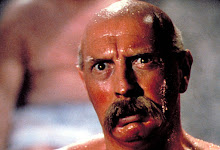
Originally run on 1 December 2008, under my column "Cinecult."
Everyone loves The Battle of Algiers—the Black Panthers, the Red Army, the IRA, Donald Rumsfeld— and for good reason. Gillo Pontecorvo’s The Battle of Algiers is one of the best-made movies about the West clashing with the Middle East and of occupation forces clashing with an indigenous people fighting for independence. It’s a complex movie that’s as relevant today as it was in 1966—perhaps even more so.
The film begins in 1957, with a recently tortured Arab man being forced to lead French paratroopers to the hideout of several key revolutionaries. The soldiers surround the hideout and threaten four revolutionaries—a man, a teenage boy, a woman and a child—that they have a choice between surrendering or being blown off the face of the other. From there the movie shifts backwards to 1954 and chronicles the eponymous battle for Algeria’s independence and the French government’s attempts to quash the rebellion.
When I was watching the film, a friend of mine passed by and asked, “Is that real?” Pontecorvo’s film is shot in the style of a documentary or a newsreel, as a grainy, handheld affair almost completely devoid of romance or theatricality. Everything is filmed with the idea that the following events just happened to pass in front of the camera (the trailer to the film has a disclaimer explicitly telling the audience that, in fact, not a single frame of newsreel footage was used in the film). Not only do shots of the city streets and rooftops look realistic, so do the frequent scenes of torture and explosions. Pontecorvo knew that these kinds of things shouldn’t be cleaned up and sanitizing them completely would compromise the film’s integrity. If you can watch a scene where a man gets a car battery attached to his ears without feeling a tad bit squeamish, then the point is entirely lost. The Battle of Algiers doesn’t shy away from harrowing violence, even when you might like it to.
The film benefits greatly from the score by legendary composer Ennio Morricone (who is probably best known for the “Waa-Waa-Waaaaa” in The Good, the Bad, and the Ugly). While Morricone does a solid job throughout the film, his talent really shines in a sequence where three Arab women prepare themselves to place time bombs in the city’s crowded French District. The score gallops along as they dye and straighten their hair, bluff their way through military checkpoints and place their deadly cargo inside of a café, an airport and a bar full of Europeans of every age and gender. His score intensifies the seconds as they tick along towards an inevitable carnage.
The bombing in turn escalates the conflict from a band of idealists taking on the government to a full-blown war against every European that calls this corner of North Africa home. The women’s three bombs rip through the crowded buildings, throwing bodies. It shows that this fight to liberate Algiers, while a righteous cause, can at the same time be a cruel and terrible thing. On the other side of the conflict are the French paratroopers, who wish to pacify Algiers by any and all means, including assassinations and enhanced interrogations (i.e., Torture). Though, in their attempt to bring order and civility to Algeria, they ironically anger the population into resisting their increasingly tenuous authority. In this world, war is portrayed as both more inhuman and less inhuman than we typically view it as. War in the world of The Battle of Algiers is a horrific and fanatical affair and it is often justified as such, but it can also simply become a mundane job with fallout and consequences.
To label The Battle of Algiers as a political film is to sell it short. Doing so would mean that half of its audience would be lost. And, while it very clearly is a movie about a political situation, it’s far more than that and it doesn’t suffer to the same sanctimonious trumpeting that Michael Moore (Farenheit 9/11, Sicko) and Oliver Stone (Platoon, W.) are known for. Even though history did side with the Algerian people, the film doesn’t take either side and leaves it to the audience to decide the exact meaning of what they just watched, like a moving Rorschach test. Regardless of where you fall on the aisle, you should be able to recognize a great story that’s well constructed on every level. The Battle of Algiers is, at its most simple, a film about the trials that a people go through for the sake of independence and self-determinism—something all Americans should be able to empathize with.
Image via Google. Naturally.



